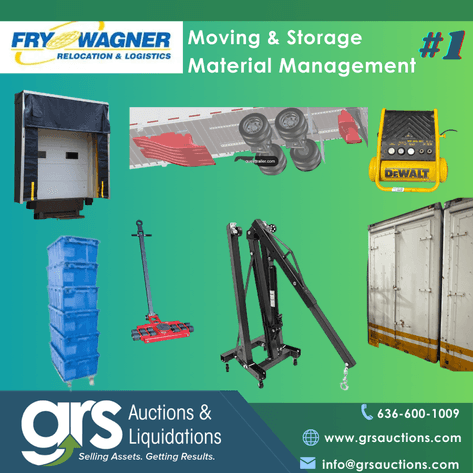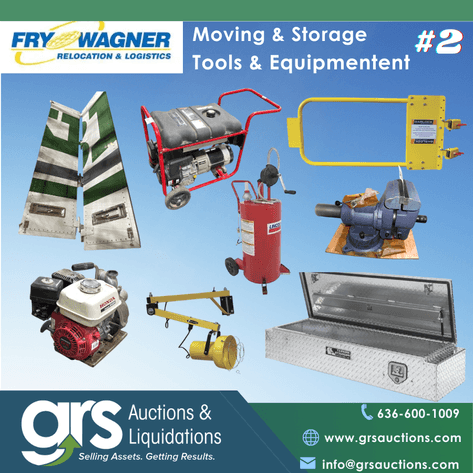As permanent business closures pick up, local auctioneer shares tips for closing or downsizing.

By Lea Konczal – Data Reporter, St. Louis Business Journal
May 20, 2020, 2:19pm EDT
We asked Nancy Cripe, CAGA and president of GRS Auction Liquidation & Strategy, for liquidation tips. Cripe serves on the recently-formed St. Louis Small Business Task Force, and was the winner of the St. Louis Business Journal's first Catapult Competition in 2016.
St. Louis Small Business Task Force
A Creve Coeur restaurant and two downtown establishments are a few of the latest regional businesses to close due to Covid-19. They almost certainly won’t be the last.
While many St. Louis businesses reopened Monday, many others are considering whether — or when — to shut down for good. A growing list of permanent closures indicates the Covid-19 pandemic has pushed some businesses past the point of no return.
Nancy Cripe, president of locally based GRS Auction Liquidation & Strategy, said her company is seeing an uptick in liquidations as more businesses shutter.
“It’s an agonizing time, and it's an agonizing decision,” she said. “But once they get to that decision that they're not moving forward, a lot of times once they have a plan to move their assets, they start to feel like they're back in control a little bit.”
We asked Cripe to share tips for businesses that are looking to liquidate, either as part of a downsizing plan or permanent shutdown. The conversation has been edited for length and clarity.
Is it a good strategy for a firm to liquidate some assets even if it’s not going out of business? If they've got good assets, and they're taking care of them, it's actually a way to bring cash into the business. It can infuse you immediately with some working capital, and also free up any costs that you might have. I think what you're going to see moving forward is a lot of businesses are going to start negotiating for smaller spaces with their landlords, and trying to figure out how to get a little bit smaller so they can — to use the 2008 term — right-size.
What types of assets should businesses sell if they want to downsize? Anything that's well-maintained. Manufacturing equipment, tools, restaurant equipment, inventories … it just depends. It can be machine parts, and what a lot of companies refer to as excess MRO, which is maintenance, repair and operations material. A lot of companies, when they upgrade a piece of equipment, they take the older one and they push it aside. It's still a good piece of equipment, but they're paying to store it. One of the things a lot of business owners don't realize is once you put it in storage, it really starts declining in value much faster. Not only that, you're paying storage costs on it.
What advice do you have for companies that need to liquidate because they’re going out of business? First, if you're in a lease, read your lease and be aware of the rules of the lease. Sometimes landlords or property management companies lay claim to things that are attached to the building. Companies may have done upgrades that they may not be able to liquidate. So they want to understand, “What can I actually sell that I've put into this building?” They want to understand the deadlines. We get calls frequently — “I've gotta be out of this building in three weeks.” And we've done it, and we can do it, but people don't make as much money as if they say, “I've got six to eight weeks to sell my assets.” The longer they can be marketed, the bigger audience you can get to, the more bidders that come on, the better it sells. For a good auction, from start to finish, it’s about 28 days.
Planning ahead gives a business time to sell on site. Why is that important? There have been several times where we're pulling up to a restaurant with a tractor-trailer and pulling everything out because they didn't make their exit strategy soon enough. In that case, what typically happens is the assets are sold and the cost of removal is deducted from the proceeds. When you can do a liquidation on site, it’s all the expense of the buyer to remove those items. You also get more value from your equipment if it can be sold on site. Because if you are going to buy a piece of equipment and you can walk in and see where it was used, how it was used, you can flip the switch and you can turn it on and see it work, you're going to have a lot more confidence in spending money on that than you are if it's removed to a warehouse, and maybe isn't hooked up.
Is there a market for used assets right now? Since we've all been shut down and locked in, we hear all the bad news, and we forget there's still people doing business. The people that are buying on our auctions right now include restaurants — a lot of the restaurants are using this time to remodel, or to make some changes to their menus and their equipment. Businesses that are in manufacturing, they still need to buy equipment. So if they can buy it on an auction as opposed to buying it brand new, it helps reduce their overall costs. We're seeing more and more businesses come over to this platform because they're trying to find assets for their own businesses that make sense to their now-reduced budgets.
Have Covid-19 health concerns impacted the local auction business? It's really interesting, but people are buying now. Our auctions are doing really well. When the shutdown first started, we had listed an auction, and I called the landlord and I said, “Hey, you know, I know he needs to be out, but we're shut down here and we're not supposed to be doing business.” She was like, “I don't care. Get his stuff out or I'm throwing it away.” So we had the auction, and it was actually a really good auction. It brought in more than I thought it would. We just conducted what we call a safe auction — gloved up and masked up and bringing things to the doorway so people don't have to come into the building.
What lender obligations should businesses consider when liquidating? They need to be aware of any UCC — uniform commercial code — filings. Whenever a business owner takes out a loan and they use their assets as collateral, the financial institution files a UCC on their asset. They cannot sell it without permission from the bank. And many times the bank doesn't want those assets back either. We did a trampoline park in O'Fallon earlier this year and the bank ended up with the assets. And of course they didn't want a trampoline park … so we came in and did the liquidation and were able to sell everything in the building.
Do you have any final tips for businesses that are closing? Make sure that when you do move out of a building, that whoever's working on the plan with you knows what the rules are. Know what can't be taken. If the seller is going to clean the building after the assets are removed, or if they're going to have the auctioneer provide that as a service ... you want to make sure that you understand exactly how that space needs to be left. And you want to make sure that you're protected legally, especially if you're ending a lease early. If you're trying to negotiate an early out, you have to have an attorney.








